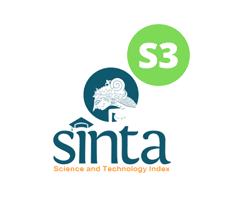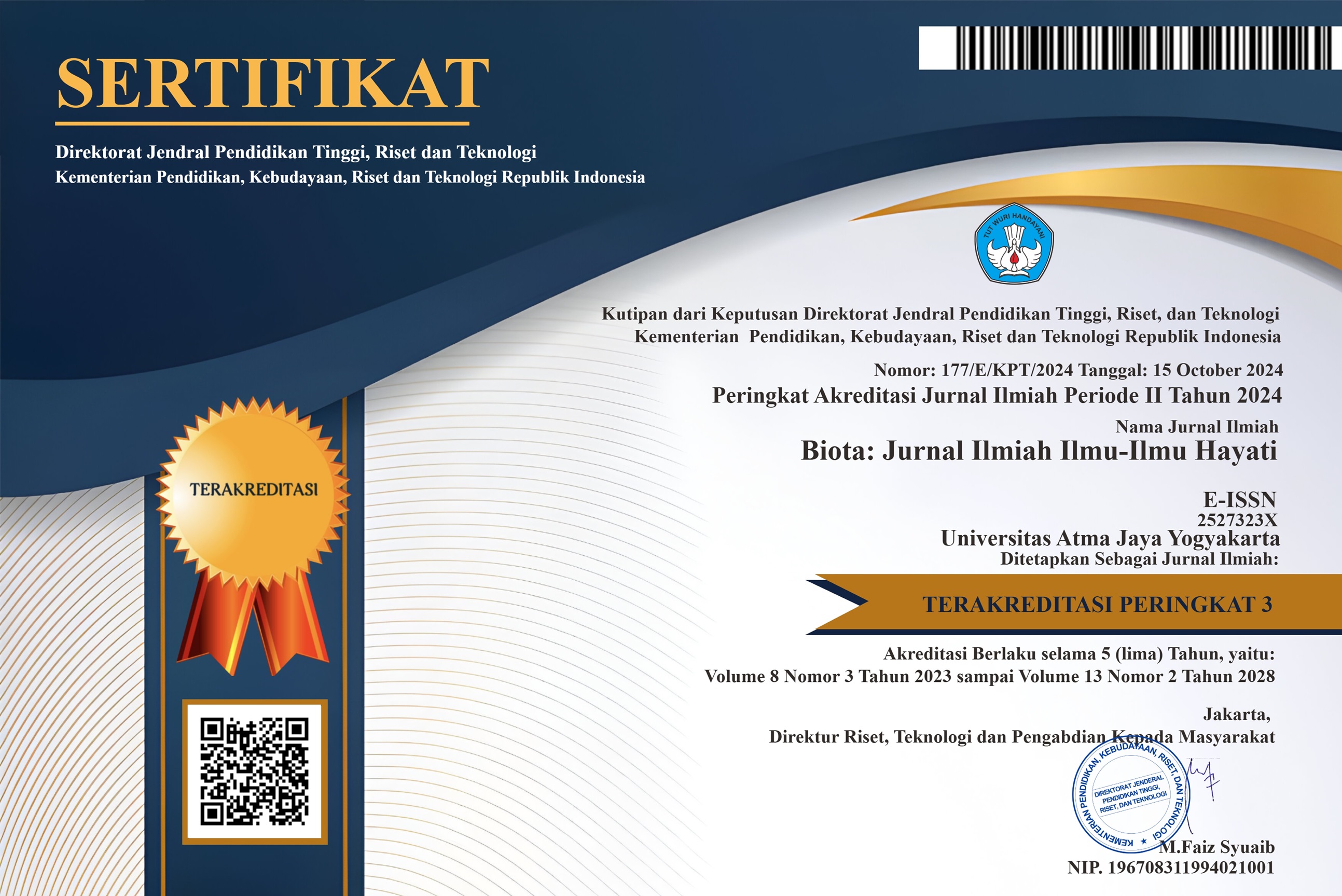Genotipe Single Nucleotide Polimorphism (SNP) Gen PLA2G10 T512C dan T-123/IN1C pada Penderita Angina Pektoris di Pusat Jantung Nasional Harapan Kita Jakarta, Indonesia
DOI:
https://doi.org/10.24002/biota.v5i3.3345Keywords:
pla2g10, snp id, t512c, t-123/in1c, angina pectoris, polymorphismAbstract
Angina pektoris merupakan salah satu gejala awal yang menjadi penanda masalah kardiovaskuler berat seperti penyakit jantung koroner. Sementara gen PLA2G10 dipercaya memiliki peran, baik dalam progresi aterosklerotik yang menyebabkan deposit plak dan penyumbatan pada arteri koroner, atau justru sebaliknya yaitu antiaterogenik. Polimorfisme PLA2G10 pada titik SNP T512C (rs36072688) dan T-123/in1C (rs4003232) mampu mengubah level ekspresi gen PLA2G10 sebagai gen pengode enzim sPLA2-GX. Penelitian ini bertujuan untuk mengetahui genotip dari PLA2G10 pada titik SNP T512C (rs36072688) and T-123/in1C (rs4003232) para penderita angina pektoris dan mengkaji apakah penyakit disebabkan karena mutasi. Sampel penelitian berupa peripheral blood mononuclear cell koleksi Divisi Litbang Rumah Sakit Jantung dan Pembuluh Darah Harapan Kita. Sampel berjumlah 113, berasal dari penderita angina pektoris dengan dan tanpa plak pada arteri koroner. Hasil penelitian menunjukkan bahwa gen PLA2G10 pada titik SNP T512C (rs36072688) memiliki genotip homozigot wildtype (TT) dan T-123/In1C (rs4003232) memiliki genotip heterozigot (TC) melalui metode TaqMan® SNP Genotyping Assay, dan tidak ada polimorfisme yang ditemukan pada kedua grup sampel tersebut.
References
Ait-Oufella, H., Herbin, O., Lahoute, C., Coatrieux, C., Loyer, X., Joffre, J., … Mallat, Z. (2013). Group X secreted phospholipase A2 limits the development of atherosclerosis in LDL receptor-null mice. Arteriosclerosis, Thrombosis, and Vascular Biology, 33(3), 466–473. https://doi.org/10.1161/ATVBAHA.112.300309
Bezzine, S., Koduri, R. S., Valentin, E., Murakami, M., Kudo, I., Ghomashchi, F., … Gelb, M. H. (2000). Exogenously added human group X secreted phospholipase A2 but not the group UB, IIA, and V enzymes efficiently release arachidonic acid from adherent mammalian cells. Journal of Biological Chemistry, 275(5), 3179–3191. https://doi.org/10.1074/jbc.275.5.3179
Coronary Artery Disease - Coronary Heart Disease | American Heart Association. (n.d.). Retrieved April 20, 2020, from https://www.heart.org/en/health-topics/consumer-healthcare/what-is-cardiovascular-disease/coronary-artery-disease
Exeter, H. J. (2012). The genetic architecture of secretory PLA2 (sPLA2) genes and their impact on sPLA2 activity/mass and association with CHD risk. University College London.
Gora, S., Perret, C., Jemel, I., Nicaud, V., Lambeau, G., Cambien, F., … Karabina, S. A. (2009). Molecular and functional characterization of polymorphisms in the secreted phospholipase A2 group X gene: Relevance to coronary artery disease. Journal of Molecular Medicine, 87(7), 723–733. https://doi.org/10.1007/s00109-009-0483-y
Guardiola, M., Exeter, H. J., Perret, C., Folkersen, L., Van’T Hooft, F., Eriksson, P., … Talmud, P. J. (2015). PLA2G10 Gene Variants, sPLA2 Activity, and Coronary Heart Disease Risk. Circulation: Cardiovascular Genetics, 8(2), 356–362. https://doi.org/10.1161/CIRCGENETICS.114.000633
Karabina, S. A., Brochériou, I., Le Naour, G., Agrapart, M., Durand, H., Gelb, M., … Ninio, E. (2006). Atherogenic properties of LDL particles modified by human group X secreted phospholipase A2 on human endothelial cell function. FASEB Journal, 20(14). https://doi.org/10.1096/fj.06-6018fje
Li, X., Shridas, P., Forrest, K., Bailey, W., & Webb, N. R. (2010). Group X secretory phospholipase a2 negatively regulates adipogenesis in murine models. FASEB Journal, 24(11), 4313–4324. https://doi.org/10.1096/fj.10-154716
Murakami, K., Irie, K., & Shimizu, T. (2015). Diet and Nutrition in Dementia and Cognitive Decline: Potential Role of Vitamin C in the Prevention of Alzheimer’s Disease. In Diet and Nutrition in Dementia and Cognitive Decline. https://doi.org/10.1016/B978-0-12-407824-6.00061-6
Musumeci, L., Arthur, J. W., Cheung, F. S. G., Hoque, A., Lippman, S., & Reichardt, J. K. V. (2010). Single Nucleotide Differences (SNDs) in the dbSNP database may lead to errors in genotyping and haplotyping studies. Human Mutation, 31(1), 67–73. https://doi.org/10.1002/humu.21137
Poupardin, R., Srisukontarat, W., Yunta, C., & Ranson, H. (2014). Identification of Carboxylesterase Genes Implicated in Temephos Resistance in the Dengue Vector Aedes aegypti. PLoS Neglected Tropical Diseases, 8(3), e2743. https://doi.org/10.1371/journal.pntd.0002743
Riches, K., & Porter, K. E. (2012). Lipoprotein(a): Cellular effects and molecular mechanisms. Cholesterol, Vol. 2012. https://doi.org/10.1155/2012/923289
Santoso, A., Heriansyah, T., & Rohman, M. S. (2019). Phospholipase A2 is an Inflammatory Predictor in Cardiovascular Diseases: Is there any Spacious Room to Prove the Causation? Current Cardiology Reviews, 16(1), 3–10. https://doi.org/10.2174/1573403x15666190531111932
Suh, Y., & Vijg, J. (2005, June 3). SNP discovery in associating genetic variation with human disease phenotypes. Mutation Research - Fundamental and Molecular Mechanisms of Mutagenesis, Vol. 573, pp. 41–53. https://doi.org/10.1016/j.mrfmmm.2005.01.005
Downloads
Published
How to Cite
Issue
Section
License
Copyright (c) 2021 Dzul Fithria Mumtazah, Erlin Listiyaningsih, Nastiti Wijayanti

This work is licensed under a Creative Commons Attribution-NonCommercial 4.0 International License.
Authors who publish with Biota : Jurnal Ilmiah Ilmu-Ilmu Hayati agree to the following terms:
- Authors retain copyright and grant the Biota : Jurnal Ilmiah Ilmu-Ilmu Hayati right of first publication. Licensed under a Creative Commons Attribution-NonCommercial 4.0 International License that allows others to share the work with an acknowledgment of the work's authorship and initial publication in this journal.
- Authors are able to enter into separate, additional contractual arrangements for the non-exclusive distribution of the journal's published version of the work (e.g., post it to an institutional repository or publish it in a book), with an acknowledgment of its initial publication in Biota : Jurnal Ilmiah Ilmu-Ilmu Hayati, and as long as Author is not used for commercial purposes.













